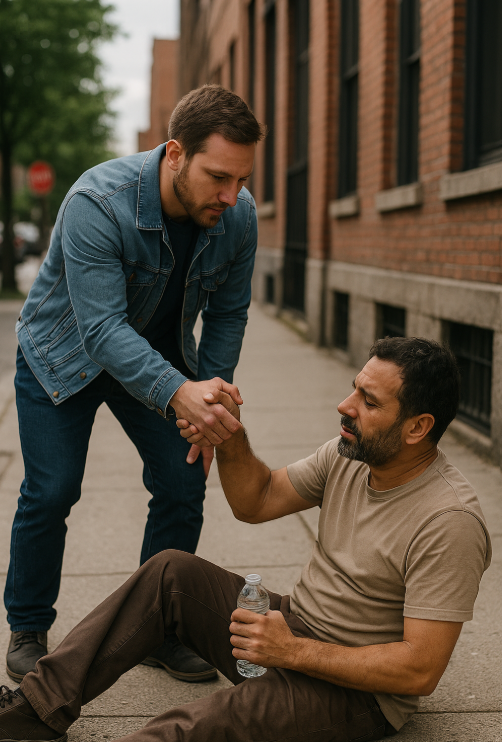When the Helper Needs Help

In my work as a teacher, therapist, and supervisor, I am deeply grateful that there are people who feel motivated to do good for others. My gratitude is directed toward that inner voice of conscience which calls us to action—to move toward something better, more just, more ethical, and more noble. But we also know that there are people who either lack the resources to follow this voice, or who, on an existential level, choose to ignore it.
The Danish philosopher K.E. Løgstrup speaks of the “ethical demand”—a demand that bids us to respond, to stop, and to act when we encounter a person in need. A powerful image of this is found in the parable of the Good Samaritan in the Gospel of Matthew, where a stranger not only sees the suffering but also acts—and through his actions helps to restore dignity and strength to the one in need. We can all find ourselves in the place of the one suffering, and therefore I thank God that there are people who dare to step forward as the Good Samaritan. Løgstrup goes even deeper, pointing out that the ethical demand awakens what he calls sovereign expressions of life: trust, care, and compassion. But the opposite can also happen: the demand may be rejected, and the response instead becomes what he calls self-centered expressions of life—such as mistrust, condemnation, harshness, and selfishness.
Alongside my admiration and gratitude for all those who choose to step into caregiving—whether as professionals, missionaries, or volunteers—I also carry a concern. Perhaps this is precisely the ethical demand I sense here, seen through my therapeutic perspective: Who cares for those who care?
I have met many Christians—especially deeply loving caregivers—who struggle with the challenge of caring for themselves. The Bible speaks in many places about not being selfish, but at the same time we as Christians are also encouraged to look after ourselves. A clear example is found in Mark 12:31: “Love your neighbor as yourself.” Here lies a presupposition: that we actually love and take care of ourselves, if we are truly to love others. The same is emphasized in several other places in Scripture: 1 Corinthians 6:19–20 “Do you not know that your bodies are temples of the Holy Spirit… You are not your own; you were bought at a price. Therefore honor God with your bodies.” – the body must be cared for, because it belongs to God. 1 Timothy 5:8 “But anyone who does not provide for their relatives, and especially for their own household, has denied the faith and is worse than an unbeliever.” – we have a responsibility for ourselves and our closest ones. Mark 6:31 – Jesus to His disciples: “Come with me by yourselves to a quiet place and get some rest.” – even Jesus encouraged His disciples to rest and to set boundaries in ministry.
The latest research in neuroscience and the nervous system now provides explanations for why so many caregivers can end up with compassion fatigue or burnout. The balance between caring for oneself and at the same time caring for one’s neighbor is often far more demanding than we imagine. It requires both experience, self-awareness, and knowledge of what happens within us when we work with people in vulnerable situations. When we read the parable of the Good Samaritan, we may easily be tempted to imitate the sovereign expression of life that moves him to act in such a sacrificial and compassionate way. But sometimes we give more than we truly have the resources for. Looking deeper into the parable, we see that the Samaritan actually acts out of the resources he has—and within a limited time. He does his part, but then also entrusts the wounded man to others so that the help may continue. The parable thus not only points to our calling to respond to the ethical demands we encounter in the world, but also to the necessity of doing so in a way that allows our own lives to remain whole.
K.E. Løgstrup was very aware of this practical dilemma: The ethical demand requires everything of us—that we stand ready to give time, energy, and resources to the extent that the one in need requires. But unless we are a walking Jesus—and let us honestly admit that none of us can live up to that—we also have responsibilities beyond fulfilling sovereign expressions of life in every encounter. For all of us, it is therefore about finding the right balances. Everyone needs mirroring—for support, encouragement, and fellowship. That is why Christians are also called to be the Church—not merely as a building, but as a living fellowship that transcends human-made boundaries, doctrines, personality types, job titles, and life stages. At the same time, there are people we can especially seek support from in particular situations: a doctor when we are ill, a mechanic when the car breaks down—or a supervisor or therapist when we ourselves struggle with the balance in caregiving.
This is precisely the motivation for starting this association: to create a network between caregivers and professionals who are particularly skilled at supporting and encouraging those who live out this calling. The goal is to prevent burnout, compassion fatigue, secondary traumatization, and reduced resilience—and to strengthen the joy and vitality in ministry. For sharing joy increases joy, but sharing sorrow can also bring sorrow. Therefore, we wish to contribute with care for the caregivers—so that you, we, and they may serve consistently with as much joy, strength, and life as possible.
Written by: Maria Christina Handberg
Reference: Løgstrup, K. E. The Ethical Demand. Translated by Bjørn Rabjerg & Robert Stern. Oxford: Oxford University Press, 2020. ISBN 978-0198855989